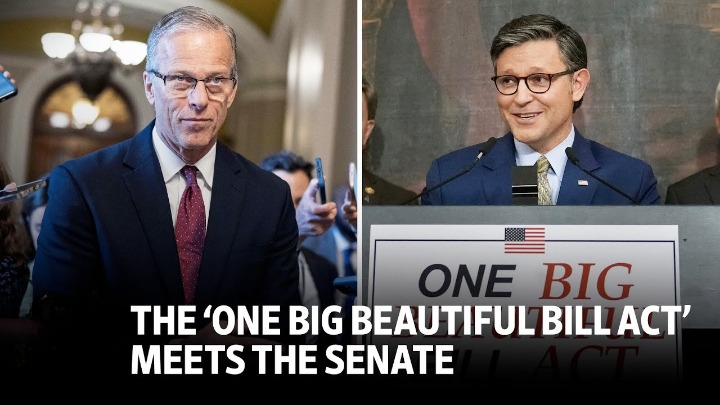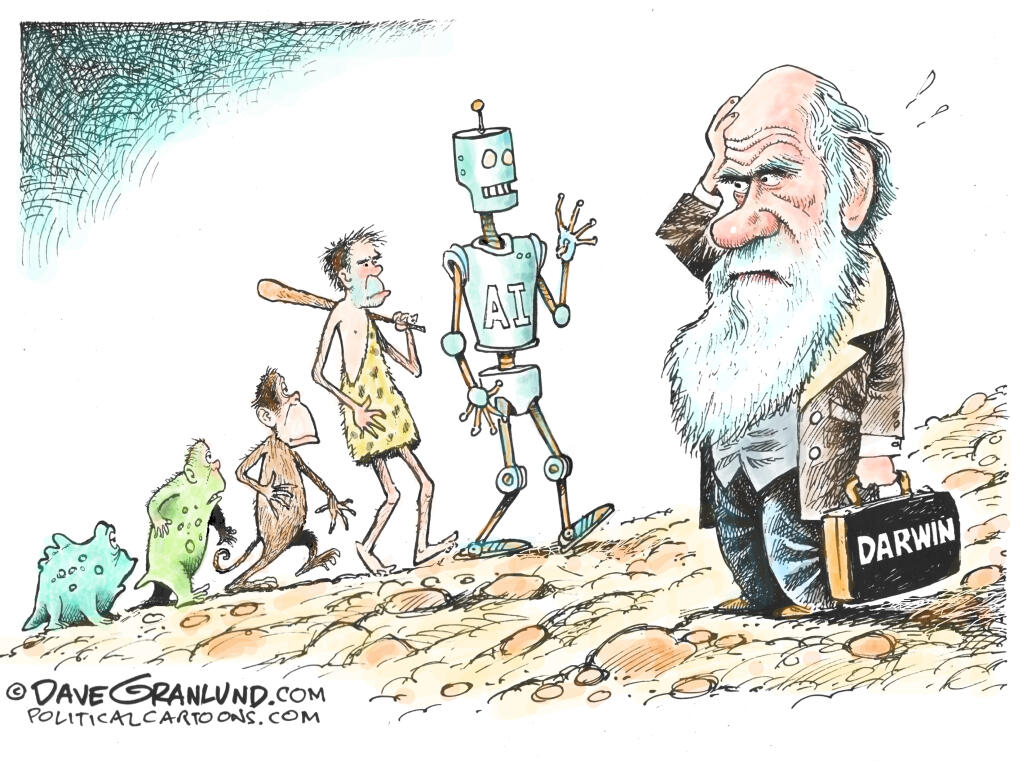
Donald Trump didn’t exaggerate by coining recent legislation passed by Republicans in the U.S. House and then transferred to Republicans in the U.S. Senate for their vote, the “One Big Beautiful Bill” because the legislation’s impact is so far-reaching and its budget cuts are so large. Unfortunately, since the impact and budget cuts are so controversial they distract attention from a true danger within the One Big Beautiful Bill.
There is a lot of discussion, fuss, outcry, cheering, support, and opposition over Republicans’ One Big Beautiful Bill. Most of the attention is directed at the $700 billion cut from Medicare, the largest in its history, and the $290 billion cut from the Supplemental Nutrition Assistance Program (SNAP) America’s food stamp program. Apparently, House Republicans fear that there is a lack of true support for these cuts among American voters, so in their version of the One Big Beautiful Bill cuts to Medicare don’t start until after the 2026 midterm congressional elections. Based on President Trump’s popularity and political clout the cuts are most likely to occur, but because of the attention the cuts are receiving there is a slim chance they could be modified or eliminated completely.

As right or wrong as the cuts to Medicare and SNAP may be, if they occur only America’s elderly and financially insecure will be negatively impacted. But there is another component of the One Big Beautiful Bill that has received hardly any attention and it could negatively impact everybody and everything!!! Section 43201 of the One Big Beautiful Bill titled “Artificial Intelligence and Information Technology Modernization Initiative” states “no State or political subdivision thereof may enforce any law or regulation regulating artificial intelligence models, artificial intelligence systems, or automated decision systems during the 10-year period beginning on the date of the enactment of this Act” The following definitions apply to this proposed law moratorium:
- Artificial Intelligence: The term “artificial intelligence” has the meaning given such term in Section 5002 of the National Artificial Intelligence Initiative Act of 2020 (15 U.S.C. § 9401), which defines it broadly to include systems that perform tasks normally requiring human intelligence, including learning, reasoning, and self-correction.
- Artificial Intelligence Model: A software component of an information system that implements artificial intelligence technology and uses computational, statistical, or machine-learning techniques to produce outputs from a defined set of inputs.
- Artificial Intelligence System: Any data system, software, hardware, application, tool, or utility that operates, in whole or in part, using artificial intelligence.
- Automated Decision System: Any computational process derived from machine learning, statistical modeling, data analytics, or artificial intelligence that issues a simplified output — such as a score, classification, or recommendation — to materially influence or replace human decision-making.
 If section 43201 becomes the law of America not only does it prevent future regulation of AI, it limits AI regulation to the U.S. House and Senate voiding any existing state or city AI regulations. The following 4 states either have current AI healthcare regulations or proposed AI healthcare regulations that would become null and void once 43201 becomes law:
If section 43201 becomes the law of America not only does it prevent future regulation of AI, it limits AI regulation to the U.S. House and Senate voiding any existing state or city AI regulations. The following 4 states either have current AI healthcare regulations or proposed AI healthcare regulations that would become null and void once 43201 becomes law:
- California: Enacted the “Physicians Make Decisions Act” (SB 1120), prohibiting health insurers from using AI to deny coverage without human oversight.
- Connecticut: Proposed SB 817/HB 5590 to prevent insurers from automatically downcoding or denying claims using AI without peer review.
- Maryland: SB0987, as proposed, would mandate the Maryland Health Care Commission to establish a registry for AI health software and prohibit the operation of unregistered AI health tools within the state. Additionally, it would restrict health insurance carriers from using AI to make or directly influence healthcare decisions.
- Massachusetts: Proposed Bill S.46 to regulate the use of AI in healthcare settings, specifically requiring healthcare providers to disclose the use of AI tools in patient care decisions.
Besides AI healthcare regulations being prevented according to the bipartisan organization that represents America’s legislatures, territories, commonwealths, and Washington, D.C., the National Conference of State Legislatures, restricting states’ ability to regulate AI “will circumvent their authority to regulate the permitting, construction and operation of data centers within their borders. This will severely limit the ability of states and localities to make decisions regarding the siting and operation of these large-scale projects, raising costs for ratepayers, jeopardizing zoning decisions that protect our mutual constituents, and impacting existing infrastructure such as power grids and generating facilities.”

Based on the multiple lawsuits like the New York Times v Open AI and Microsoft, AI companies apparently feel free to commit copyright infringement by collecting data and information owned by others, without permission or financial compensation, to train their artificial intelligence technology. Whether it’s those AI-generated convincing but fake emails people receive asking for credit card information, bad actors using AI technology to create deepfake videos that falsely impersonate politicians or celebrities, or businesses and governments increasingly relying on AI tech to make life-impact decisions that human beings traditionally make, American society can’t trust the AI world to regulate itself.
Supporters of the 10-year AI no regulations moratorium cite the time-honed universal and standard rationale for no government regulation, it stifles innovation and competition. In October 2023 former President Joe Biden signed Executive Order 14110, titled Executive Order on Safe, Secure, and Trustworthy Development and Use of Artificial Intelligence its policy goals were:
- Promoting competition and innovation in the AI industry
- Upholding civil and labor rights and protecting consumers and their privacy from AI-enabled harms
- Specifying federal policies governing procurement and use of AI
- Developing watermarking systems for AI-generated content and warding off intellectual property theft stemming from the use of generative models
- Maintaining the nation’s place as a global leader in AI

The policy goals of Biden’s executive order struck a good balance between promoting competition and innovation while protecting the constitutional rights of American citizens. It also provided a framework for creating federal legislation to regulate AI. Unfortunately a year and approximately 3 months later in January 2025 Donald Trump rescinded it within hours after being sworn in as President. 3 days later he replaced it with Executive Order 14179, titled Removing Barriers to American Leadership in Artificial Intelligence its policy goals were:
- It revokes existing AI policies and directives that are seen as barriers to U.S. AI innovation.
- It mandates the creation of an action plan within 180 days to sustain U.S. AI leadership, focusing on human flourishing, economic competitiveness, and national security.
- It requires the review of policies, directives, and regulations related to Executive Order 14110 (from October 2023) to identify actions that may conflict with the new policy goals.
- Agencies are instructed to suspend, revise, or rescind actions from the previous executive order that may be inconsistent with the new policy.
- The Office of Management and Budget (OMB) must revise certain memoranda (M-24-10 and M-24-18) within 60 days to align with the new policy.
- The order specifies that it does not create new enforceable rights or benefits and should be implemented within the boundaries of existing law and appropriations.
In other words, a return to the no-regulation AI world where AI tech innovators bear no responsibility no liability for any negative impact their AI tech has on American society, or for any violation of an American citizen’s constitutional rights. President Trump’s AI executive order turned out to be the framework for the One Big Beautiful Bill’s 10-year moratorium on AI regulation.

Budget cuts that eliminate life-sustaining healthcare for those in need appropriately should be an attention-grabbing concern to all Americans, but America is a rich and powerful nation that can chew gum and take care of many attention-grabbing concerns at the same time. The possibility of a new law that prevents regulating AI for 10 years must equally grab the attention of all those concerned about Medicare cuts, because if AI remains unregulated for 10 years not only could providing life-sustaining healthcare for those in need end, sustaining American society as we presently know it will end!!!
